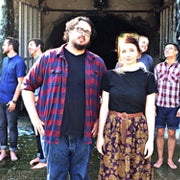
The Oh Hellos
The Oh Hellos
Samantha Crain
The Oh Hellos began in a cluttered bedroom, where siblings Maggie and Tyler Heath (born and raised in southern Texas) recorded their self-titled EP in 2011. In the fall of 2012, the duo released their debut full-length record Through the Deep, Dark Valley, an album full of regret and redemption, which they wrote, recorded, produced, mixed, and mastered themselves.
When the time came in early 2013 to bring the music to the stage, the Heaths reached out to friends both new and old and gathered together an ensemble of touring musicians the size of a circus, tumblers and all.
Their 2015 full-length album, Dear Wormwood—a collection of songs inspired in part by C.S. Lewis' The Screwtape Letters, Patrick Rothfuss' The Name of the Wind, mythology, folklore, and apocalyptic literature—tells the story of a protagonist trapped in an abusive relationship through a series of letters written to the antagonist. It is at times delicate, intimate, affectionate; and at others, soaring and towering and joyfully explosive.
Notos, the first installment in an ongoing series, is named for the ancient Greco-Roman god of the south wind, who brought storms in the summer. Musically, the record draws from the siblings' memories of summers spent exploring the Pacific Northwest with their grandparents, as well as their experiences with the frequent threat of hurricanes as they grew up on the Texas Gulf Coast. Thematically, the series considers the question: "where did our ideas come from?" Notos recounts a time when the duo weren't even aware there was a question to ask, and reflects on the backfire effect we experience when confronted with new information for the first time.
Their influences range from Fleet Foxes and Sufjan Stevens to The Middle East and the Muppets, bending and blending styles and genres into a unique mixture of eclectic folk rock.
You Had Me at Goodbye, the fifth full length studio album from Samantha Crain, finds the literary tendencies of her songwriting allowing room for a wink and a nod. This wildly original album stands as the authoritative statement thus far from an uncommonly insightful and intrepid musician. Crain, who recently turned 30, has often been pegged an “old soul” by reviewers and music writers, beginning at her first release at the age of 19. Crain found that for some time, she yearned to fit that mold. As she puts it, “That label permeated me: my songwriting, my demeanor, my aesthetic. I acted older than I was, or how I thought older people acted, because I was unsure of myself, as any young person can be, in many ways.” Coming of age, for Crain, probably seems counterintuitive to longtime fans---flame colored hair, increasingly comical stage banter, and, most notably, a new embrace of something previously absent in her catalogue so far: the pop song.
She returned to the Bay Area in California to record, once again, a completely analog record at Tiny Telephone Studio (this time, however, at the newly opened Tiny Telephone Oakland annex studio). The project was recorded in 7 days and mixed in 5 days, consecutively, in August of 2016. Her lyricism is, as always, in turns clever and startling, her signature voice stands boldly out front and unambiguous due to the characteristically audacious, otherworldly production of John Vanderslice (Spoon, The Mountain Goats, Strand of Oaks). The songs feel at once untouchable and welcoming—a lively party full of complete strangers, one of whom chooses you to confide in. This sonic juxtaposition of warmth and cold is apropos. Crain says, “I just wanted to have some goddamn fun and make an album that was a picture of me: searching and whole, confident and paralyzed, happy and sad.”
You Had Me at Goodbye opens with the uptempo, sixties-inspired, chamber pop tune “Antiseptic Greeting” in which Crain, over jaunty percussion and fanciful, dreamy keys, details a battle with “resting bitch face.” The series of anecdotal encounters portrays an assumed failure to be a woman de rigueur: expected to be pleasant to others instead of engrossed in one’s internal thoughts. The feminist tone will be familiar to fans of Crain’s last album, 2015’s “Under Branch & Thorn and Tree,” a heart-wrenching series of social narrative songs.
That album employed a Crain songwriting signature also found in spades on the new album: using verse to paint a narrator’s personal encounter with vivid characters. “Oh Dear Louis,” from the new album, is another written through Crain’s lens. In this realm, Crain tries---and fails---to help a friend but cannot quite get there. “It seems like I’m always loyal, but completely inept” she admits. The song’s smart orchestral arrangements (written throughout the album by James Riotto) and powerful rhythm frame the refrain: “Oh dear Louis / I wasn’t too far to hear you cry.”
During the beautiful slow-burner “Loneliest Handsome Man”, clarinets and strings saunter and careen in jazzy ways around Crain’s story of a friend completely sucked into an ideal of an personal image, while the following song “Wise One” explores the coexistence of pain and joy in the realm of love and picks up the pace again with a bit of distortion and ethereal helium background vocals.
For “Red Sky, Blue Mountain,” Crain, who is a tribal member of the Choctaw Nation of Oklahoma , took on the significant task of writing a new traditional in the Choctaw language. “I've had many conversations with fellow Native American artists and musicians about their worries of not being traditional enough or attached to their heritage enough to seem legitimate. Many tribes have been stripped of their original songs and their languages and traditions because of colonization, and those left behind in the rubble of culture have little resources or education to bring them back to life.” The hymn, translated from Crain’s lyrics with help from Choctaw elder, Dora Wickson, deals with a lack of connection to Earth and how our intuition about the land has dissipated in the face of modernity human behavior.
“Smile When” buzzes and clicks with an art punk spirit even though the subject matter is an ode to the imagined lover of Jimmy Webb’s “Wichita Lineman”. The humorous, robot-like chorus of vocals acknowledges Crain’s sense of humor and faithfulness to experimentation.
Last year, Crain’s friend, Oklahoma based songwriter Beau Jennings, tasked her with writing a song about Oklahoma’s Will Rogers for a documentary and recorded album he produced. When she was unable to find any songs about Rogers’ wife---also his business partner and confidante---she wrote “Betty’s Eulogy.” “They seemed so fit for each other, so connected. I felt there would be a missing piece to have this anthology of his life without including her thoughts.” Crain said. “I wanted to write a song that was more or less her eulogy and remembrance of him after his death.” Crain again touches on her Oklahoma roots with a somber and exploratory take on “When the Roses Bloom Again,” her first cover to be included on a record, with lyrics by Will D. Cobb and music by Jeff Tweedy, found in the journals of Woody Guthrie, an Oklahoma folk figurehead and famed political commentator—perhaps a nod to Crain’s previous incarnation, the troubadour dragged across the country by wanderlust.
“Windmill Crusader” pleads, “You have to believe me / you have to believe me,” touching on the “prophet without honor” trope as in Greek mythology’s Cassandra, who had the gift of foresight and a curse bestowed upon her that prevented people from heeding her warnings. The song modulates and changes keys and vibrates as it follows the frenetic desperation of trying to warn and then the battling guilt and peace of being proven right in tragedy.
The lilting album closer, “Wreck,” details the frustration of being full of love with nowhere to direct it; think of it as a gentler rendition of Springsteen’s “I’m on Fire.” After listeners are taken on Crain’s zig-zagging stylistic journey throughout the album, “Wreck” serves as the destination, the sudden stop at the end of a winding road she has taken you on: an expansive view of the album’s overarching theme, not one that can be found in only lyrics or musicianship, but the soul searching of the artist herself.
In total, Vanderslice’s production choices feel unexpected until well into each song, where his vision strikes a modern balance with Crain’s familiar expressiveness, which is uniquely audacious for someone in her position. Wandering and static, joyful and lamenting, You Had Me at Goodbye takes listeners down a back alley, away from the easily definable and comfortably digestible, but on a tour of music being make just for the sake of expression and inspiration. It’s not storytelling so much as an invitation to search for more. Crain on record, as in life, does not mistake vulnerability for weakness. She’ll leave you in the dark and let you in on a secret in the same breath.
Read More
Design VisualSHOWINGS
This event has already occurred.
Jefferson
-
Fri, May 9, 2025
Pony Bradshaw
-
Sun, May 11, 2025
Dorothy
-
Fri, May 16, 2025
Captain Mike & The Shipwrecked
-
Sat, May 31, 2025
Start Making Sense


